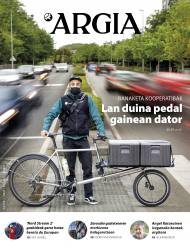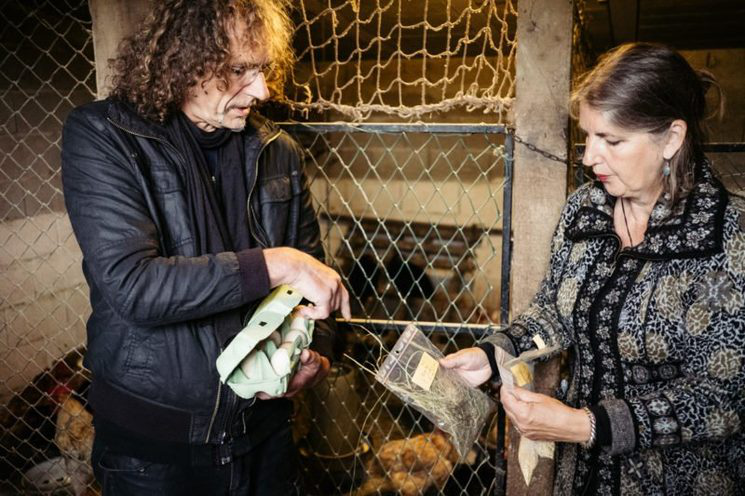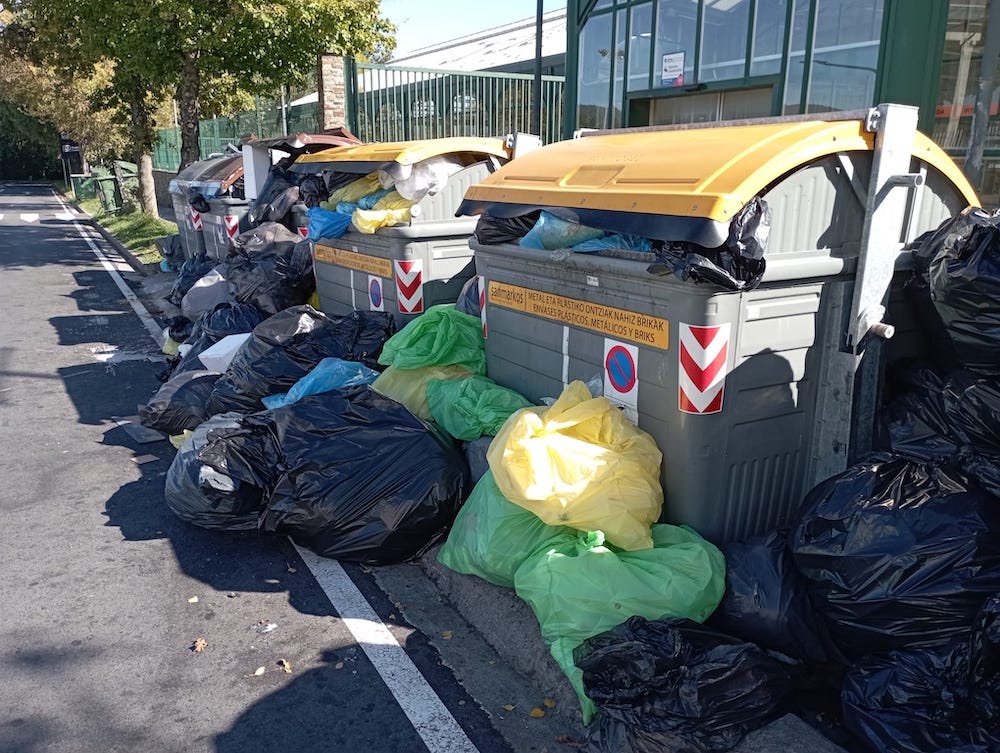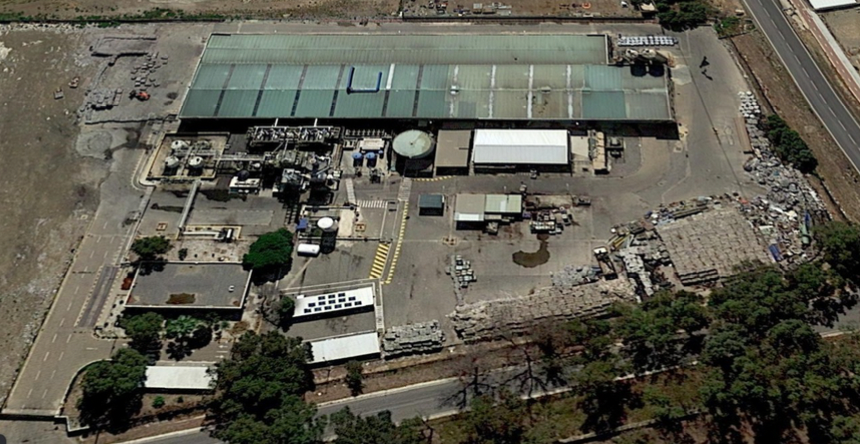Anyone brings home what they haven't eaten at school
- Since May 4, anyone circulating in the Txantxilla neighborhood in Hernani can bring packaged food home without paying anything. Simply press the button of the machine to take the ration collected in the compostable container. This food is the surplus of the dining rooms of the Langile and Aratz schools, and its older students manage what they have not eaten in the school. The City Hall has explained to us why this pilot test has been started and what the next steps are planned.
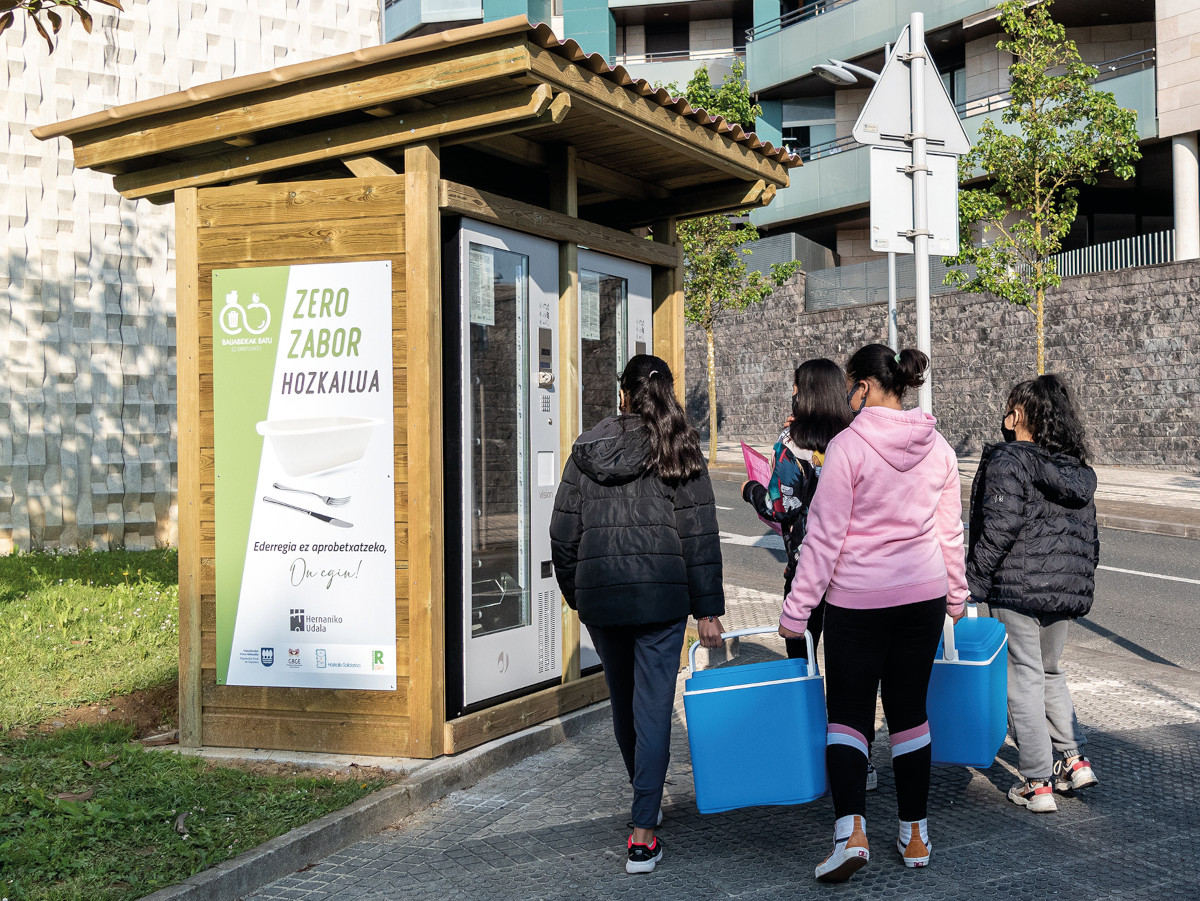
Did you know that a standardized standard for several catering companies in school canteens is to have to throw away all the leftover food from the dining room? In other words, is it forbidden for the staff of the canteens subject to this protocol to distribute the remainder? Between 7% and 10% of food is spent every day in dining rooms, according to similar refrigerators.
As from 4 May, Aratz and Langile have solved this absurd. It is now the responsibility of the students of the sixth meter into the compostables the leftover food of the dining room, to heat it with a transparent compostable material, to label it and introduce it into a machine that plucks the temperature of the food from 65 to 4 degrees. And, once this process of health insurance has been completed, bring these food-filled containers to the machine that is available to all citizens on the street. This daily work is not slow to gain awareness and responsibility.
The importance of being for all
We have come to the Hernani City Hall to learn the details of this project and have been explained to us by the Environmental Councilor, Mattin Aldaia, and the waste educator, Jone Notary, in the company Garbikania.
They have been pleased to have managed to launch a project that has asked for the approval of many agents: schools, dining room staff, Ausolan, catering company... “As usual, the issue of food health raises concerns. It has not been so easy and we have been overcoming obstacles. But we have achieved it,” explains Aldaia and Notary, adding that, in his view, it has been to have powerful infrastructures that no one can deny. The City Hall has installed in these two centres the necessary infrastructures for this process: compostable packaging, thermosealant, labeling and its printer, temperature abator and two refrigerators. The City Council has made an investment of EUR 8,500 in the following infrastructures of each centre: since the pilot test has been launched in two centres, the expenditure of this project amounts to EUR 17,000 for the time being and the Provincial Council of Gipuzkoa has compensated with a grant of 55% of the cost.
Avoiding food waste has a direct relationship with another of the objectives pursued by the City Hall: to reduce the generation of organic waste. “Because food that is not eaten in the dining rooms has to be managed: collect them, transport them later and finally give a treatment in an infrastructure next to the incinerator. This has a cost that should be avoided,” explains Aldaia. He points out that they must pay EUR 148.33 per tonne of organic lead to the treatment plant, “to which must be added the costs of collection and transport”.
When looking for the solution to these foods that were deposited in the waste, the City Hall went to the Social Volunteer Association of Galdakao and this association explained how the program “Fridge Solidario” is underway in Lasarte-Oria, Tabakalera de Donostia, Galdakao, Vitoria-Gasteiz... In Plentzia the City Hall also has the Solidarity Refrigerator installed and the School of Hospitality of Leioa had it in its day (currently the surplus goes to food banks).
They were based on these experiences, but the format to make packaging available to the public is different: anyone can leave and take these foods in common refrigerators in other villages (refrigerators like the one we have at home), and they have opted for those food selling machines that are used in Hernani, providing the model they saw in Valencia: “Because these machines are closed, we have it more controlled. Press a button and bring the container that has been removed, do not touch the other containers. It’s safer,” explains Aldaia.

At the Hernani Zero Zabor refrigerator, the machine has a capacity for 108 boats for up to 24 hours. On the first day the chicken and on the second day the lentils have been available to the public. The refrigerator is supplied at 9:00 in the morning and the first days have all run out before two hours. That's the goal of the refrigerator that bears on behalf of Trash Zero, among all of us taking advantage of the food. And being free puts this goal within everyone’s reach: “We must not restrict anyone, it is for any citizen. And because we don't want to fall into stigmatization, you don't want one or the other. It’s for everyone, anyone can use it, it’s more, you have to use it for responsibility.”
If it does, what are the next steps?
The City Hall was also concerned about schools, what could be done with food left over. As the notary said, “at the meeting we gathered all the local elementary schools to explain this project. As proposed as a pilot test, we had material for two centers and we started with the two that were animated in the first place.”
In May the Zero Trash Refrigerator was launched and in June the schools will finish the course. Therefore, the test will be a month and a half. “If it goes right, we intend to open it,” says Aldaia. The City Hall is expected to expand in two areas: on the one hand, to invite the other schools to participate in this initiative and, on the other, to open the opportunity for restaurants. And that is that, as Aldaia pointed out, when they were aware of this pilot test, the restaurants have asked the City Hall because they are also concerned about the food they are eating. “We have to study how to ensure that these foods are usable, taking great care to ensure their health,” adds Aldaia.
Food is a food that brings food sovereignty to all citizens in this machine. At the time several schools in the locality had a kitchen, no matter what food was cooked in it, and today they did not have the possibility to take advantage of the next day the surpluses of a day in the dining room, as we do at home. In addition, they could choose where and how to buy each of the ingredients in the dish.
Why not dream, that school canteens will serve food sovereignty through these street fridges, in the future.

The City Hall of Donostia-San Sebastián announced at last Thursday’s plenary session that it will increase the waste rate by 26.5% from January 2025, claiming that Waste Law 7/2022 obliges this. Eguzki, for its part, has denounced that the law only applies in terms of costs,... [+]
Recently, the UPV/EHU organised a series of summer courses to address the issue of climate change. The Environment Minister, Asensio, took advantage of the courses to highlight the incinerator’s positive contribution to climate change, which is surprising, since for every tonne... [+]







